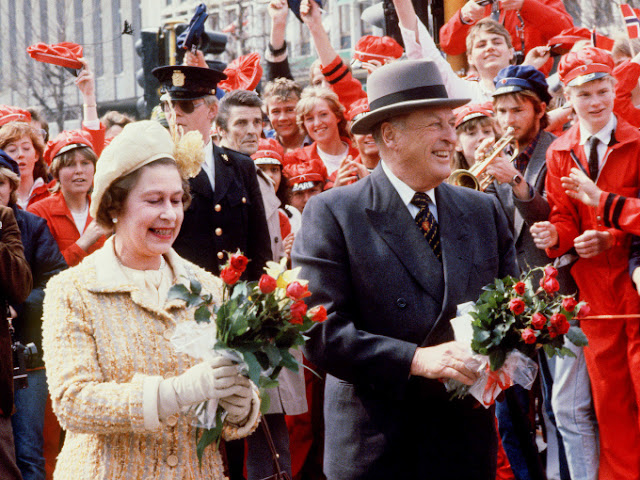 |
| Queen Elizabeth II (UK) and King Olav V (Norway) in Stavanger, 1981. Source. |
My one encounter with royalty was totally by chance. On Thursday, September 23, 1971, my grandfather Knut and I went to Oslo's old Fornebu Airport to see my aunt off as she began her return from Norway to the USA. As we passed through the central hall, we saw a bit of a stir, and then realized why: King Olav V was arriving into the hall, and was being greeted there by his son Crown Prince (now King) Harald. The small crowd at the scene clapped warmly, and in a couple of minutes the whole thing was over.
I was struck by the calm normalcy of the scene, and the fact that a random bystander like me could witness the whole thing at little more than arm's length. If security forces were present, they were well concealed.
The scene came back to me as I reflected on the death of Queen Elizabeth II a week ago. In the tiny world of European royalty, Norway's and the UK's royal families are related: Norway's first king of the modern era, Haakon VII, was married to the youngest daughter of Britain's King Edward VII and Queen Alexandra. She became Queen Maud of Norway when her husband accepted the Norwegian throne. This meant that Queen Elizabeth II and King Harald were second cousins.
 |
| King Haakon and Crown Prince Olav, shortly before leaving Norway in June 1940. The royal families of Norway and the UK gained great respect by their conduct in World War II. Source. |
This plebiscite may be one of the few examples of a monarchy rooted in a democratic process, but the 21% "no" vote showed that the issue was far from unanimous. Even now, the Norwegian parliament (as of 2019) includes a roughly similar percentage of legislators who would favor conversion to a republican form of government.
To the perennial debates about the advantages of having a monarch for the sake of national cohesion I have little if anything to contribute. Yes, kings and queens and grand potentates of all brands are usually unelected, but in modern times they are also practically without political power. They may inherit their ancestors' sinful legacies (for example, colonialism and all its cruelties), but can we expect those ancestors to have been wiser than their contemporary constituencies? And in any case the guilt is shared with other political actors of those times, and with acquiescent populations who enjoyed the fruits of colonialism.
Norway's current royal dynasty benefits from the residual goodwill and legitimacy of having been approved in a plebiscite. (Note, however, that in 1905, all Norwegian voters were male.) But royalty in both Norway and the UK is sustained by a different sort of poll: the weight of popular approval. In both countries, individual members of the royal families have become controversial, but the actual monarchs have distinguished themselves by their dignity, their ability to connect with their constituents, and their consistent spirit of dedication to their countries.
Crucially, these sovereigns maintained a crucial distance from political power and political controversy. Should USA citizens envy these monarchies and their ability to project and protect national identity? I don't think so. I cannot think of any process by which we could choose a figure to carry out a monarch's symbolic duties, so the whole question is completely hypothetical. We have our own national conceits that could serve us (as they have sometimes in the past, however imperfectly) as points of unity: the Constitution, the Declaration of Independence, the high ideals of government of the people, by the people, and for the people. Occasionally, we have temporarily anointed celebrities as exemplars of our national values, or at least of some of them—Helen Keller, for example, Mark Twain, Billy Graham, Eleanor Roosevelt. For some, the U.S. flag has uncanny power.
If we lose our commitment to due process and the equal protection of the law, no national celebrity, symbol, or charismatic figurehead will restore them, and if in desperation we choose a ruler of this kind, he or she may well become a dictator. I find it far more useful to admire the British and Norwegian monarchies, and to cherish the lessons they teach about courtesy and service, than to dream about some kind of equivalent American royalty. For better or worse, we are our own Caesars.
Unless we abdicate.
Whatever advantages this or that system may have in preserving national identity and fair access to scarce resources, I can't help reflecting that, the end, we are still just two-legged mammals. We insist on fooling ourselves with our elaborate behavior patterns and sense of self-importance. The only importance we really have involves getting to know our Creator, and through that relationship, learning how to cherish and care for the rest of creation. Kings and queens come and go, but—as Elizabeth II seemed to know well—there is only one Prince of Peace.
Wikipedia: Republicanism in Norway.
Norwegian tributes to Queen Elizabeth II.
UPDATE: Norway's king and queen attend Queen Elizabeth's funeral.
Fighting the Western Left's stereotypes about Ukraine.
Natalia Savelyeva and her colleagues interviewed 200 Russians about their attitudes towards Putin's invasion of Ukraine.
Claire Flourish finds it deceptively difficult for Quakers to discuss politics.
Nancy Thomas and her September warning: Dangerous women, dangerous books.
Blues from Ukraine: Konstantin Kolesnichenko plays William Clarke.
No comments:
Post a Comment